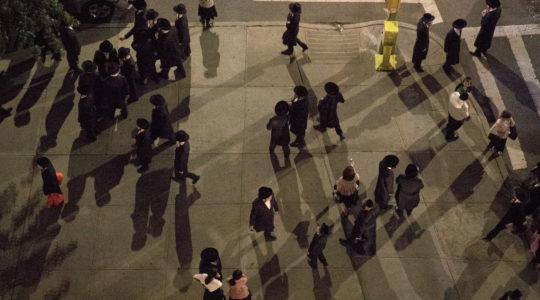Erel Margalit, 50, one of Israel’s most successful and wealthiest venture capitalists, is not only going into politics, he’s planning to start at the top. He is running for chairman of the Labor Party in the hope of becoming prime minister. (The Labor elections are scheduled for September.) The Jerusalem-based entrepreneur has helped found the Avoda [Labor] Now movement, geared toward reviving the party that headed every Israeli government in the country’s first three decades; it has declined precipitously in recent years. The Jewish Week spoke with him by phone recently to discuss his political goals.
Q: You were selected by Forbes a few years ago for its Midas List, as the top-rated non-American venture capitalist. Why go into politics?
A: My decision to enter a political career comes from somewhere deeply internal. I turned 50 on Jan. 1, and felt that, for my “Startup Nation” generation, our time has come. Stepping back and looking at how issues are handled in Israel is a big worry, from my perspective, so the impetus for me was to get up and make a difference. When [Defense Minister Ehud] Barak left Labor [as its chairman], I felt the party was exposed in a way that it never was before. The fact that the party that created the state and gave it direction was losing its vitality was unbearable.
How do you perceive the problem?
There is a sense, especially among younger people, that Israel needs to do things differently. Our leadership is reactive, not proactive, and we are being maneuvered into different, difficult situations. For the first time there is a danger that Israel can be delegitimized, and the unilateral decision by the Palestinians to seek statehood in the United Nations could lead to small events that will accumulate and put Israel in a corner. The smarter way is to put your ideas on the table and work with allies like the U.S. and Europe to back you rather than oppose you. The Mideast is a complicated chess game but [Prime Minister] Bibi [Netanyahu] is playing with the mentality of a nervous player. We need to be smart but also calculating, appealing to our allies. But it won’t work if we don’t come up with our own initiative.
How will your background in business serve you politically?
Most of our business growth is focused around a narrow strip in the center of the country and includes only a small part of the population. If we continue like that, we will have a big gap in our society. Those of us who have been involved in economic growth feel we can have many more people involved in the growth process. We need to increase incentive for the ultra-Orthodox, Arab and Galilee communities to grow, creating a larger base of economic activity and a more just society in terms of how wealth and opportunities are spread. That’s not socialism; it’s pragmatism with a social conscience that will be good for the country.
Israel needs its own social economic vision that is just and good.
What’s your strategy for getting elected chair of Labor? It’s a crowded field, including Amram Mitzna, Amir Peretz, Isaac Herzog and Shelly Yacimovich.
Young people in particular are idealistic and want change. My message is that we must, and can, reconcile social values with capitalist ideas and growth. Revival of cities is key, and my expertise is in the economic development in Jerusalem. Mayors, city planners and business leaders have invited me to discuss my success in this area. I am a person of initiative.
We have been stuck in old disciplines when we need innovation.
Through the Avoda Now campaign to make Labor relevant, the party’s expected mandate has doubled to 16 [seats in the next Knesset]. If we can revolutionize the party, we can make it relevant again and make real change in Israel. That includes pluralistic Judaism so that the state does not dictate what kind of Judaism is accepted, which corrupts all factions.
Support the New York Jewish Week
Our nonprofit newsroom depends on readers like you. Make a donation now to support independent Jewish journalism in New York.
Israel should be a creative hub, a place where every Jew would view the country as not just a place they owe allegiance to.
The New York Jewish Week brings you the stories behind the headlines, keeping you connected to Jewish life in New York. Help sustain the reporting you trust by donating today.




